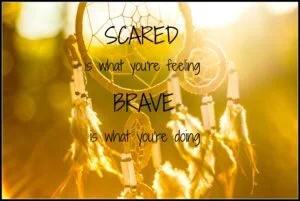5 Things You Need To Do If Your Suffer Anxiety
I often wonder - are more people anxious today, or as a society, have we been successful in making our mental health important - so we're now hearing from those who are anxious?
Regardless what the answer is, it appears to me that what we need to do to attend to people's anxiety, is to educate, educate, educate - help them understand it; help them take back control.
In this blog, I'm going to list 5 things that you need to make part of your life if anxiety is in the driving seat and I'll come back at a later date with a little more psycho-education on why it's important you do these. In a nut shell, I can give you all the information in the world on anxiety but it's useless unless you take action.
Start Deep Breathing - if you take some time to practice this before you're overwhelmed by anxiety, it will be more accessible to you in the times you need it most. Deep breathing is a great way to calm the body, sending oxygenated blood to it's entirety. When you're anxious, your body is preparing for danger and therefore blood is sent primarily to your internal organs, allowing you to run or fight; this is why you can feel faint or experience tingling in your arms and legs.
This is also really important in those situations where you're able to tell yourself that there is no real danger because, if you are to get back in the driving seat, then you need to train your body, teach it that not everything is a threat - and you do this by helping it relax, reducing the hormone levels and sending oxygen around it.
TIP: Breath in deep and try and fill your tummy and lungs, breath in for 3 seconds. Breath out through pursed lips, releasing the air from your tummy and then your lungs and be mindful of relaxing your muscles. Do this regularly throughout the day and at times when you're starting to feel anxious.
2. Conquer Your Critical Voice - it may be that in your history, your inner voice is what kept you safe and kept you alert to dangers...but if anxiety persists, without a danger, then you need to tune in to what your thoughts are in the situations that trigger your anxiety. If you are overestimating the danger or a problem you are facing, and underestimating your ability to cope then anxiety will remain the driver.
TIP: Step back and make a note of what it is that triggers your anxiety and make a list of the thoughts you have. Once you have these, you will see your belief system, you can check out it's validity and how it serves you today and you can then plan the steps you need to take, to tame and change your thinking.
3. Improve Your Physiological Care - I talk about self care all the time on my social media channels, on my Facebook Page this month for example, I post a self care motivational tip each Monday but when it comes to the specifics of anxiety, your physiology needs to be your priority. You need to make sure you are fueling your body, resting your body and exercising your body in a way that means it can function at it's best. We are so very complex, our bodies are easily mistreated and you need to make sure you're giving yourself the best chance of having the energy it needs to stay focused and be well.
TIP: Take some time to research what your body needs to function at it's best and see how you can get these to fit into your daily routine e.g. are you likely to drink 2 litres of water a day? Would you stand a better chance if you have a 1 or 2 litre bottle to carry around with you?
4. Communicate Your Experiences - it may be that you have friends or family that you can speak to about your experiences, it may be that you need some professional support to manage the psychological difficulties or because your social circles don't really do 'feelings' or 'serious talk'. Communicating your experiences allows opportunity to psychologically process what's happening, it means you hear your thinking out-loud and it means someone else can help keep you accountable to the changes you're making. Speaking about what you've achieved too, also means you're more likely to get external recognition for what you've done and that always feels good right?
TIP: Make a list of the people that you think would take you seriously and have a positive impact on your journey - if you don't do this, you may end up reinforcing negative beliefs about your experience or feeling missed and let down.
and last but not least...
5. Think Of This As A Process - anxiety can feel so debilitating and so you can be forgiven for wanting a quick fix, but the truth of the matter is - there isn't one. Anxiety will never vanish from your life but if you work hard and have the right support, you can get it to a functioning level. It will never disappear, not because you are broken but because anxiety is normal, anxiety has helped us stay alive over the years and it will continue to do so. The likelihood is that your body and brain have become accustomed to anxiety; to the hormones and to the thought processes we spoke about above - it will take time and effort to retrain, re-mould or re-build your system so that it's functioning at a level that doesn't impair your life.
TIP: It's a good idea, when starting a new journey, to keep some kind of diary of the progress; what the challenges have been, what your success have been and what your thoughts and feelings about your life and challenges are along the way. If you do this, when you are feelings beaten or tired of trying, you can reflect back and notice that whilst the changes may be small at first - they are changes nevertheless

